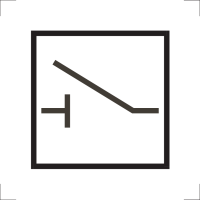Isolator Definition
Nantian Electronics, as a professional supplier of RF isolators or microwave isolators, provides different types of isolators including: Digital Isolators, Isolators, Optoisolators and other special purpose isolators.
What is Isolator?
Isolators, also known as RF isolators or microwave isolators, are passive electronic devices designed to allow the transmission of radio frequency (RF) or microwave signals in one direction while significantly attenuating or isolating signals in the reverse direction. They are commonly used to protect RF components and systems by preventing unwanted signals or reflections from traveling back into the source, which can cause signal degradation, instability, or damage to sensitive equipment.

Isolator symbol
Isolators are typically made of ferrite materials and consist of a circular waveguide or coaxial structure with a magnetized ferrite disk in the center. The isolator's operation relies on the Faraday effect, where the magnetized ferrite material rotates the plane of polarization of the passing signal. This rotation allows signals to pass through the device in one direction but attenuates signals in the opposite direction.
The Function of Isolator
The function of an isolator in the context of electronics and radio frequency (RF) systems is to provide unidirectional signal transmission while blocking or isolating signals in the opposite direction. Here are the primary functions and benefits of isolators:
1. Signal Isolation: Isolators allow signals to pass from the input port to the output port with minimal attenuation and interference. This prevents signals from traveling back to the source, ensuring that sensitive components and signal sources remain isolated from the load or other connected devices.
2. Reflection Prevention: Isolators are designed to block or attenuate signals that attempt to reflect back towards the source. This prevents signal reflections, which can lead to interference, standing waves, and signal degradation.
3. Signal Integrity: By eliminating reflected signals, isolators help maintain the integrity of the transmitted signal. This is particularly important in RF and microwave applications where signal quality is critical.
4. Protection: Isolators protect signal sources, such as RF transmitters and amplifiers, from damage caused by power reflections. When signals are reflected back into a source, it can overload and damage the source.
5. Directional Control: Isolators exhibit unidirectional behavior, meaning they allow signals to pass in one direction (from input to output) while blocking signals in the reverse direction. This property ensures that signals flow only where intended.
6. Noise Reduction: Isolators can help reduce unwanted noise and interference in RF systems by preventing signals from being reflected and interfering with the primary signal path.
7. Matching: Isolators can aid in achieving impedance matching between RF components and systems, which is crucial for efficient signal transfer.
Isolator Applications
Isolators are commonly used in RF and microwave applications, including amplifiers, antennas, transceivers, and other devices where signal quality, protection, and signal integrity are paramount. Their unidirectional nature and reflection-blocking capabilities make them essential components in various RF systems.
How to Choose an Isolator
Choosing the right isolator involves several key considerations. First, define your application's purpose and frequency range. Decide on the required level of isolation, as measured in decibels, and check the insertion loss to minimize signal loss. Port configuration, power handling, and connector compatibility are essential. Consider the operating environment, size, and application-specific features. Opt for reputable manufacturers or suppliers, prioritizing quality over price. Ensure compatibility with other RF components in your system. By addressing these factors, you can confidently select the ideal isolator for your specific needs, ensuring optimal signal quality and system performance.
Isolator Buying Guide
When purchasing isolators for your electronic or RF system, consider key factors for an informed choice. Begin by identifying your system's frequency range to match isolators designed for it. Ensure adequate isolation performance to maintain signal integrity while keeping insertion loss in check. Choose the appropriate port configuration (single, dual, or multi-port) and check the isolator's power handling capacity to handle your signal levels. Verify connector compatibility and assess the isolator's ability to withstand the operating temperature range of your application. Consider size, form factor, and any application-specific features that might be beneficial.
Prioritize reputable manufacturers and quality over price and ensure compatibility with the rest of your RF system for seamless integration.
Excellent electronic isolators include Texas Instruments Incorporated, Analog Devices Inc., Skyworks Solutions Inc., Infineon Technologies AG, NVE Corporation, Rohm Semiconductor, Broadcom inc., Vicor Corporation, STMicroelectronics N.V. and Renesas Electronics Corporation, etc.